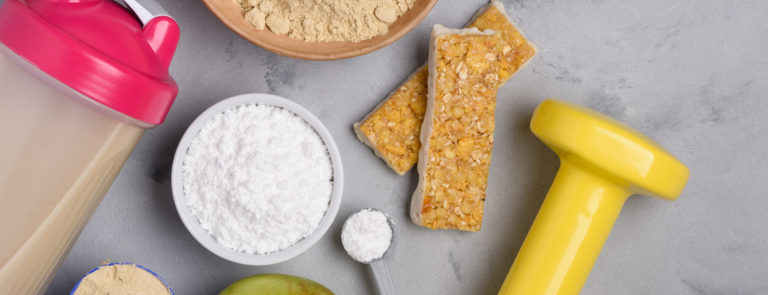15% off €25
Code:SPEND
The best vegan sports supplement routine

Can a vegan ever work out as hard as a non-vegan? The answer is yes – but you need the right nutritional support. Read on to discover the best vegan sports supplements.
Thousands of vegans in the UK are interested in sport, fitness and bodybuilding, while countless high-profile athletes and celebrities globally have turned to a plant-based lifestyle to help them maintain their lean muscle and overall health.
However, it can be a minefield choosing the right sports supplements, as ingredients like whey, casein and gelatine are cornerstones of so many fitness powders, foods and snacks.
Here we take a look at some of the reasons why being a vegan athlete is so beneficial, as well as the key nutrients that vegans need to be mindful of when participating in sport, exercise or bodybuilding.
We’ll also recommend a full regime of vegan supplement, including pre workout, protein powder, post workout hydration and protein-rich snacks.
Is it better for you to be vegan?
This is a topic hotly debated among foodies, the health-conscious and fitness fans alike. It’s certainly true that there are many clear benefits to becoming a vegan. Aside from the proven environmental benefits, there is a clear benefit to animal welfare when more people eat a plant-based diet. Of course, it’s possible to eat an unhealthy, unvaried vegan diet. When we consider that crisps, plain pasta and many biscuits are vegan, it becomes clear how easy it is for a picky vegan to eat a nutritionally lacking diet. However, vegans have the pick of a huge variety of nutritious foods and with some forethought, a vegan diet can be one of the healthiest around.Veganism in athletics, sport, fitness and bodybuilding
Some people, especially those interested in sport, fitness and bodybuilding, are wary of vegan diets as they don’t believe a plant-based meal plan can offer them the nutrients they need. These nutrients generally include protein, vitamin D and vitamin B12. This is a common misconception, but the truth is, it’s perfectly possible to get what you need from plant-based sources. Here are some common queries about diet for active vegans:Do vegans need B12?
The short answer is yes – everyone needs small amounts of vitamin B12 to facilitate red blood cell formation, energy production and healthy bones. 1 Plant sources of B12 are hard to find, so many vegans choose a vegan B12 supplement. Vegan vitamin B12 can be found in yeast extract spreads, edible seaweed, fortified cereals and plant milks, and many vegan protein powders are enriched with vitamin B12. The richest source of omega 3 fats is oily fish – but vegan omega 3 supplements made from algae, flaxseed, chia or echium seed oil also provide all you need.Where can vegans get vitamin D?
Vitamin D is vital for healthy bones, teeth and muscles.2 Vegan vitamin D is hard to find – but it’s hard to find in non-vegan diets, too. In fact, most of our vitamin D comes from sunshine, not food. The NHS recommends everyone take a vitamin D supplement containing 10mcg vitamin D during the darker months. 3 There’s no need to look for special ‘vegan vitamins’, as vitamins are chemical and don’t contain animal products. However, sometimes gelatine is added to tablets as a biding agent so be sure to check.Where can vegans get protein?
There are plenty of plant-based protein sources. However, plant-based protein (with some exceptions, such as soy) doesn’t tend to have the full range of amino acids required to make it a ‘complete’ protein – and the protein they do contain tends to be in lower amounts than protein-rich animal sources. Combining plant proteins, for example brown rice and beans, solves this problem and offers the full range of amino acids which make up a ‘complete’ protein. Vegan protein powders are an excellent place to get your protein. Protein powder is a highly concentrated version of plant protein which has undergone extensive micro-filtering, so you’ll get a high dose of protein without taking on too many calories.What does it mean to be vegan friendly?
‘Vegan friendly’ generally means that the product is suitable for vegans. However, be careful. A shop, café or restaurant describing itself as ‘vegan friendly’ will cater to vegans but not necessarily sell exclusively vegan products. It also depends on your own personal rules as a vegan. If a product isn’t certified vegan, but is ‘vegan-friendly’, it may have been prepared alongside animal products. It’s best to speak to the manufacturing company if in any doubt.Vegan workout support
Being a vegan doesn’t mean you can’t achieve muscle strength, stamina and exercise endurance to equal your non-vegan counterparts. Our suggested vegan supplement regime will ensure you get the protein, amino acids, vitamins and minerals you need to fuel your workouts and recovery. From increasing your energy, reducing fatigue, enhancing exercise performance and promoting recovery – the best vegan supplements for exercise do all of this and more.Pre workout supplements:
This pre workout includes a wide array of vegan ingredients to fuel your workout. These include:- Caffeine
- Creatine
- Beta-Alanine
- L-Citrulline



